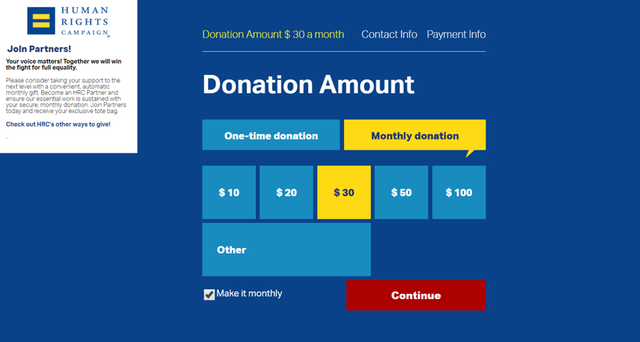The science of fundraising: Ask a behavioural scientist, part three
Does naming your campaign improve acquisition? What should you call your monthly donor programme? The answer to these and other fundraising questions may be found in behavioural science.
- Written by
- Kiki Koutmeridou
- Added
- October 15, 2020

Introduction
Our thanks as ever go to the Agitator and DonorVoice, and of course to Dr Kiki Koutmeridou, for letting us reproduce these Q&As on SOFII.
Behavioural science is a key study of human actions flowing from understanding behaviour, attitudes and motivations. It usually includes the fields of sociology, social and cultural anthropology, psychology, as well as behavioural aspects of biology, economics, geography, law, psychiatry, and political science. A behavioural scientist researches and attempts to explain human behaviour. This research can be done in many ways. Some studies require participants to fill out surveys about their behaviour, thoughts and reasoning behind actions. In other words it’s the science of how people will think and act, or are most likely to act, given any set of circumstances and it relies heavily on the study and understanding of neuroscience (the science of the human nervous system – ie, how the brain works).
As such, behavioural science could potentially be a fundamental tool for understanding why people give to charity and under which circumstances donations are more or less likely.
Dr Kiki Koutmeridou is a behavioural science expert who works closely with charities on the application of behavioural insights to charitable marketing communications. For the past couple of years, she has been answering fundraisers’ questions via the site of our friends The Agitator and we are extremely grateful to Kiki and The Agitator for letting us reproduce some of those questions and answers on SOFII. We will frequently publish new questions, so please stay tuned to learn when new content on this topic is available.
We also want you to get involved. Kiki has kindly agreed to answer any questions you may have that don’t appear here. If you have any, please ask them in the comments section below. Now over to Kiki!
- Joe Burnett, SOFII’s contributing editor
Q: When using an anchor-based vertical ask string, is there research on whether the Other: $____ option is best at the top of string or at the bottom?

Example: Other: $_____
$600
$300
$150
$75
or $600
$300
$150
$75
Other: $_____
Kiki: I’m not aware of anyone testing these specific layouts so I don’t have any data to share. But the anchoring effect takes place when people see an influential number first. So, I’d expect an anchoring effect to appear with the second layout, when you start with the $600, which gets imprinted on people’s mind.
However, it might be worth testing this yourself. There’s a chance that people might glance at the first and second rows together in which case an anchoring effect might occur there too.
Q: We’re having an internal debate over the use of ‘Dear Friend’ v ‘Dear ACLU Supporter’ (where we cannot use a name). Is there any research that supports one over the other?
Kiki: I’m not aware of any research testing specifically ‘friend’ against ‘charity supporter’ but here are some thoughts based on other insights:
- As part of several projects we’ve done on consent with different NGOs, we found that in most cases ‘CHARITY supporter’ was a message that was highly preferred by their supporters.
- In addition to being favoured by the supporters themselves, such a message plays another important role; it primes or activates the person’s identity as a supporter of that specific charity. This solidifies their relationship with the organisation and it can lead to consistent behaviour i.e. if I am a supporter of that organisation, then I will support it.
- The word ‘friend’ while it intuitively feels that it’d create feelings of closeness, it might actually backfire because it might feel ‘salesy’. Too many businesses are using it, and it might be now engrained in people’s minds as a marketing trick.
- Finally, thinking on our social lives, we don’t really call a friend ‘Friend’, unless we’re introducing them to someone else ‘here’s my friend, Name’. What we do is call them by their name. So, if you do consider your supporter as your friend, the appropriate way to call them is by their name and not by the definition of your relationship.
Based on all this, I’d opt for ‘ACLU supporter’. Of course, my top recommendation is always to test this for yourself with your audience to see what actually works best.
Q: My non-profit is embarking on a very intentional race equity journey that is transforming how we look at, and do, our work. Translating this to our fundraising operations has been a challenge, in part because best practices in fundraising earn that distinction because they’ve been optimised by a white-dominated profession for white donors. How can behavioural science help transform tried-and-true fundraising concepts so we become more competent at engaging communities of colour?

Kiki: You are right. Different cultures might be subject to biases to different degrees. For example, there’s some evidence that loss aversion bias – losses loom larger than gains – is a universal phenomenon but it presents substantial cross-cultural differences. More specifically, individualistic cultures, e.g. the western world, are more prone to loss aversion compared to more collectivistic cultures such as in east Asia. Please note that the effect was still present; it was just less strong. The same could be true for other biases.
But your fundraising practices might not be totally different; they just might be more or less effective. All this means is you need to test any interesting insight you hear about. This is actually no different to what any other organisation should do. Even if the research findings or fundraising practices are based on population of the same culture, there are still other factors that could affect their effectiveness e.g. the person’s connection to the cause, wealth, age etc. So you, just like any other organisation, should test specific fundraising or behavioural interventions with your audience using your material and tone of voice to find what works best for you.
As a side note, you might find that some of the so-called best practices have never actually been tested in a robust way, even using a white audience. Unfortunately, they may have just been based on anecdotal evidence or hunches. So my recommendation to test goes for all practices and all organisations.
Q: Is there any evidence that shows whether a name for your monthly donor programme improves acquisition and retention? Does it foster a sense of exclusivity and belonging? I’m not sure I would be able to get an accurate or honest answer if I were to ask this question directly of our donors.
Kiki: I don’t have any hard evidence on this. I’m not even sure if anyone has ever tested the exact same programme with and without a name so we can tell. But here are some thoughts:
1. Yes, a name might improve the monthly donors’ sense of belonging, but so could the label WWF Supporter, which is also more inclusive. As a supporter, you might actually do more than monthly giving; you might sign a petition, volunteer, share news, etc.
2. Yes, a name could show them that this is an exclusive group and that they are special. However, some supporters might not like it. For example, we have data from an international relief client that the supporters hated, yes, hated, the idea of being considered as an ‘elite’ group.
I’m not saying don’t use a name. In the very least, a logo and a name might help you unify all communications about this programme. All I’m saying is don’t fret about it. The name, or lack of it, is not going to determine the success of your monthly giving programme. There are many successful sustained programmes that don’t rely on a special name or brand. Supporters don’t sign up for a monthly gift because of its name. They sign up because they want to make a difference and support a cause they believe in. Also, they don’t stick with the programme because of a fancy name; they stay only if they are satisfied with the programme and can still afford it.
Sometimes too much thought goes into the branding of the programme when the focus should be on:
- Who you target: what are the supporter identities that would make a person a good candidate for a monthly gift?
- Capturing your supporters’ identity and other insight e.g. their commitment to the organisation. This information could predict their retention.
- Tailoring journeys based on the insights you captured e.g. their identity. That’s how you keep them. If what you send them matches who they are and what they want to hear from you, you’ll increase retention.
- Asking for feedback: were they satisfied with the online sign up process, with the conversation with the fundraiser, with specific touchpoints? By finding issues and fixing them, you will also increase retention.
In short, the planning and execution of the programme is what will determine acquisition and retention. Name or not, if you create a solid campaign based on your supporters’ insights, you’ll be fine.
Note: Don’t forget to stay tuned for the next round of questions. And to submit your own in the comments section below. And you could read more of Kiki’s expertise in the following links:
http://agitator.thedonorvoice.com/deliberate-giving/
http://agitator.thedonorvoice.com/how-do-you-find-out-why-people-give/
http://agitator.thedonorvoice.com/the-donor-identity-is-lame/



















